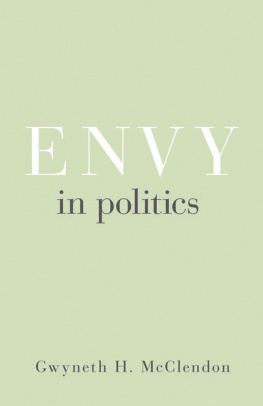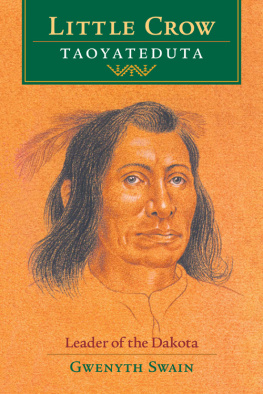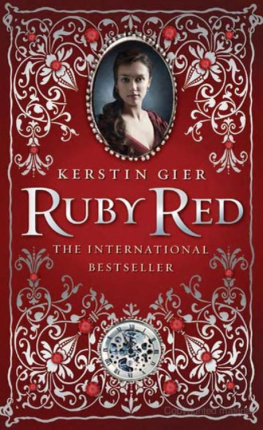McClendon Gwyneth H. - Envy in Politics
Here you can read online McClendon Gwyneth H. - Envy in Politics full text of the book (entire story) in english for free. Download pdf and epub, get meaning, cover and reviews about this ebook. year: 2018, publisher: Princeton University Press, genre: Politics. Description of the work, (preface) as well as reviews are available. Best literature library LitArk.com created for fans of good reading and offers a wide selection of genres:
Romance novel
Science fiction
Adventure
Detective
Science
History
Home and family
Prose
Art
Politics
Computer
Non-fiction
Religion
Business
Children
Humor
Choose a favorite category and find really read worthwhile books. Enjoy immersion in the world of imagination, feel the emotions of the characters or learn something new for yourself, make an fascinating discovery.
- Book:Envy in Politics
- Author:
- Publisher:Princeton University Press
- Genre:
- Year:2018
- Rating:3 / 5
- Favourites:Add to favourites
- Your mark:
- 60
- 1
- 2
- 3
- 4
- 5
Envy in Politics: summary, description and annotation
We offer to read an annotation, description, summary or preface (depends on what the author of the book "Envy in Politics" wrote himself). If you haven't found the necessary information about the book — write in the comments, we will try to find it.
Envy in Politics — read online for free the complete book (whole text) full work
Below is the text of the book, divided by pages. System saving the place of the last page read, allows you to conveniently read the book "Envy in Politics" online for free, without having to search again every time where you left off. Put a bookmark, and you can go to the page where you finished reading at any time.
Font size:
Interval:
Bookmark:

Envy in Politics

Edited by Tali Mendelberg
RECENTLY PUBLISHED IN THE SERIES
Communisms Shadow: Historical Legacies and Contemporary Political Attitudes by Grigore Pop-Eleches and Joshua A. Tucker
Resolve in International Politics by Joshua Kertzer
Democracy for Realists: Why Elections Do Not Produce Responsive Government by Christopher H. Achen and Larry M. Bartels
Envy in Politics
GWYNETH H. MCCLENDON
PRINCETON UNIVERSITY PRESS
Princeton & Oxford
Copyright 2018 by Princeton University Press
Published by Princeton University Press,
41 William Street, Princeton, New Jersey 08540
In the United Kingdom: Princeton University Press,
6 Oxford Street, Woodstock, Oxfordshire OX20 1TR
press.princeton.edu
All Rights Reserved
Library of Congress Control Number: 2018932150
ISBN 978-0-691-17865-3
British Library Cataloging-in-Publication Data is available
This book has been composed in Sabon Next LT Pro and Hevetica Neu LT Std
Printed on acid-free paper.
Typeset by Nova Techset Pvt Ltd, Bangalore, India
Printed in the United States of America
10 9 8 7 6 5 4 3 2 1
CONTENTS
FIGURES
TABLES
ACKNOWLEDGMENTS
I owe a debt of gratitude to many people for helping me bring this book to fruition. It started as a dissertation project, and I owe special thanks to my advisors in graduate school: Evan Lieberman, Robert Keohane, and Carles Boix. None of them shied from asking me tough questions, and each knew how to help me find my own wings, as it were. Evans scholarship on South Africa and ethnic politics has inspired me in countless ways. Without Bobs willingness to indulge my half-baked ideas, this project would never have gotten off the ground. Carless good-humored skepticism about the undertaking at various points was one of my biggest motivators. Leonard Wantchekon became an important fourth reader when he came to Princeton University toward the end of my time there. The final product benefited immensely from his suggestions.
Many other members of the Princeton community helped me formulate early ideas for the project. I would particularly like to thank Mark Beissinger, Mina Cikara, Rafaela Dancygier, John Darley, Amaney Jamal, Atul Kohli, Phillip Petit, Grigore Pop-Eleches, Keith Whittington, and Deborah Yashar for providing feedback, cautions, and advice. The graduate students in the Politics Department were often my most lively interlocutors. Thank you to Graeme Blair, Brookes Brown, Will Bullock, Peter Buisseret, Sarah Bush, Jeff Colgan, Kevin Collins, Michael Donnelly, Sarah El-Kazaz, Sarah Goff, Yanilda Gonzalez, Kristin Harkness, Vinay Jawahar, Kristina Johnson, Noam Lupu, Michael McKoy, Michael Miller, Meredith Sadin, and Teppei Yamamoto. The interdisciplinary group of graduate students in the Fellowship of the Woodrow Wilson Scholars also provided useful suggestions. Three friends deserve special mention: Lauren Davenport, Lisa McKay, and Kanta Murali have provided me with incredible support, encouragement, and good humor at key moments as this book evolved.
The Mamdouha S. Bobst Center for Peace and Justice, the Fellowship of the Woodrow Wilson Scholars at Princeton, and the MacMillan Centers Program on Democracy at Yale University provided financial support for data collection and writing. While I was a postdoctoral associate at Yale, Susan Stokes, Thad Dunning, Tariq Thachil, Ana De La O, and Elizabeth Carlson provided a space for reflection and gave me useful feedback on different aspects of the project. I presented parts of the work at American Political Science Association annual meetings, Midwest Political Science Association annual meetings, Princeton University, New York University, and Yale University. Peter Loewen, Patrick Emmenegger, Jan-Emmanuel De Neve, John Stephens, Victoria Shineman, and Tumi Makgetla provided valuable discussant comments on early drafts during those workshops and conferences.
The field experiment on participation in collective action was made possible only with the cooperation of an LGBTI advocacy organization. I owe special thanks to its director for his interest in my research questions and his enthusiasm for executing the experiment. The set-up and results from that field experiment were published as Social Esteem and Participation in Contentious Politics: A Field Experiment at an LGBT Pride Rally in the American Journal of Political Science in 2014. I thank John Wiley and Sons, Inc. for permission to reprint a version of this article in this current volume. Rick Wilson, three anonymous reviewers at AJPS, and Don Green provided crucial feedback that greatly improved that article before I expanded it into a section of this book.
For their friendship, help, and guidance in South Africa over the years, I thank Estelle Prinsloo, Gcobani Qambela, Ntobeko Qolo, and Siyabonga Yonzi, as well as Kenneth Chatindiara and Diego Inturralde at Stats SA and the staff at the Cory Library at Rhodes University. Various academics, including Justine Burns and Jonny Steinberg at the University of Cape Town and Patrick Bond at the University of KwaZulu-Natal, offered probing questions and helpful advice at the early stages when I was a graduate student doing fieldwork. Back in 2008, Pumi planted the seed of what would become the main ideas for this book, and some of Jonny Steinbergs writings nurtured that seed as I endeavored to turn it into a research agenda. I also owe a debt of gratitude to the numerous politicians and bureaucrats who took the time to help me.
I finished the book at Harvard University and benefited from being surrounded by many talented colleagues there. Robert Batess close reading of a draft proved invaluable. He is the master of writing concise, insightful books and encouraged me to keep it short. I have endeavored to follow his lead and advice, albeit quite imperfectly. I would also like to thank Stephen Ansolabhere, Melani Cammett, Dan Carpenter, Amy Catalinac, Ryan Enos, Jeff Frieden, Claudine Gay, Josh Kertzer, Horacio Larreguy, Nancy Rosenblum, Prerna Singh, Dan Smith, Arthur Spirling, Dustin Tingley, and Daniel Ziblatt, among many other colleagues, for their advice and support at various points.
Eric Crahan at Princeton University Press and Tali Mendelberg, the series editor, generously took an interest in and a chance on the book. I owe them as well as two anonymous reviewers tremendous thanks for their comments and encouragement. The book is immensely better as a result. Kelley Friel made excellent copy edits to the draft manuscript.
I could not have accomplished any of this without the support of my family. In particular, my parents, Judith and Charles, and my sister, Emma, inspire me every day with their creativity and passion for learning, research and teaching. My husband, Scott, has been steadfast over the last fifteen years, seeing me through college and graduate school as well as the transition to faculty life. He has accompanied me around the world for travel and fieldwork, challenged me on every idea, and forgiven me my periods of self-doubt. Most important, he has been a full partner in raising our daughter, Eleanor. I hope she will read this book one day and find it worthy of esteem.
Envy in Politics
ONE | Introduction |
Status Concerns and Political Behavior
T his book touches on three long-standing political questions: How do citizens evaluate public policies? Under what conditions do governments act in service of their constituents material interests or fail to do so? Why (and under what conditions) do citizens participate in politics? Each of these questions is important in its own right. Together they cover much of what politics is about: public opinion, policy implementation, and political participation.
Next pageFont size:
Interval:
Bookmark:
Similar books «Envy in Politics»
Look at similar books to Envy in Politics. We have selected literature similar in name and meaning in the hope of providing readers with more options to find new, interesting, not yet read works.
Discussion, reviews of the book Envy in Politics and just readers' own opinions. Leave your comments, write what you think about the work, its meaning or the main characters. Specify what exactly you liked and what you didn't like, and why you think so.









